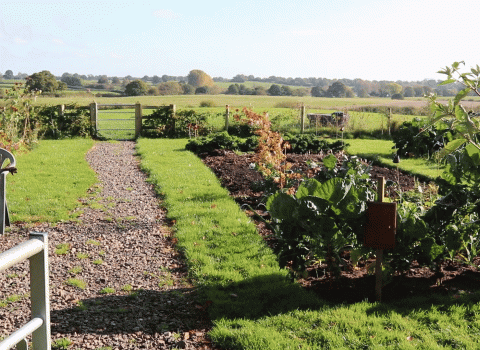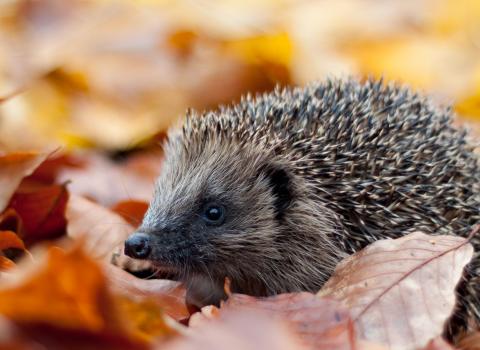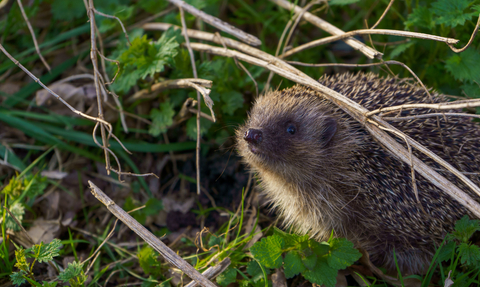
(c) Rachel Bradshaw
How you can help hedgehogs
Everyone can take steps to protect the UK's most beloved species. Whether you have a garden or use a green space, follow these tips to help hedgehogs thrive.
Take action
Finding an injured and/or sick hedgehog
Should I try to help a sick or injured hedgehog?
Hedgehogs usually hibernate between November through to mid March, but they can sometimes be seen out and about during this period changing nesting sites. It is unusual to see a hedgehog staggering around during winter or in daylight, so if you do see one and it looks unwell, it might need a helping hand.
Handling and care of a sick or injured hedgehog
Hedgehogs are wild animals, so being handled is a stressful experience. If you are unsure, contact a specialist group before trying to help. If you decide to intervene, here's what to do:
Prepare a cardboard box with high sides by lining it with a towel or scrunched up newspaper (so that the hedgehog can hide).
Find yourself a pair of gardening gloves before gently scooping up the hedgehog into the box.
Keep the box in a quiet, warm place: a hot water bottle filled with hot tap water wrapped in a towel can provide a gentle heat source – make sure it doesn’t go cold!
You can provide some fresh water and meaty cat or dog food, but don't try to feed the hedgehog directly.
What to do next
If you haven't already, contact The British Hedgehog Preservation Society, who can offer in depth advice and help you find a local rescue centre. Cheshire Wildlife Trust does not offer a general service for care and rehabilitation of sick or injured animals.
For more information on hedgehogs in general, head over to our hedgehog species information page.
Garden wild
Leaving patches of long grass will attract insects and other wildlife. Create a variety of habitats and keep your garden green. Paving and decking over gardens reduces ‘hog habitat.
Choose insect- attracting plants
Red admiral on verbena c. Claire Huxley
Attracting insects - including bees, butterflies and other pollinators - does wonders for your garden. Not only will it help your plants to thrive but they will provide food for a host of other birds and beasts, hedgehogs included!
Connect your garden
Habitat loss is a major cause of hedgehog declines. As urban gardens are increasingly fenced in and cut off, hedgehogs are unable to move between them to find food and mates. A small hole 13cm x 13cm (the size of a CD) will connect your garden with others.
Control pests carefully
Slug pellets can kill hedgehogs.
Provide good food
The hedgehog’s natural diet mainly consists of invertebrates such as ground beetles, caterpillars and worms. During cold or dry periods, these creepy-crawlies become much scarcer in gardens, so hedgehogs will benefit hugely from a shallow dish of water and supplementary feeding.
Leaving food out for hedgehogs can help them during cold snaps and help them reach a healthy hibernation weight. A white meat dog or cat food, dry cat biscuits, or a dedicated hedgehog food are suitable. Please don't give hedgehogs bread and milk - it's very bad for them as they are lactose intolerant.
Give a 'hog a home
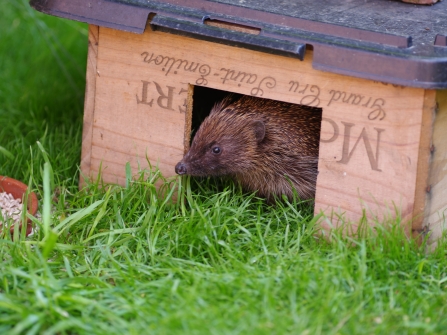
Providing hedgehogs with a home throughout the year will encourage them to take up residence in your garden. You can purchase hedgehog homes or why not make your own?
If you'd like to build your own, there are many guides out there for all manner of mansions.
Stack wood
This encourages a rich feast of earwigs, centipedes and woodlice, perfect food for 'hogs! Woodpiles will also provide refuges for wildlife to hide in.
Build a ‘bug hotel’
Stuff your hotel with lots of straw and hollow plant stems and earwigs, woodlice and centipedes will soon make it their home. They're perfect food for hedgehogs and other lovely garden wildife including nesting birds.
Create nesting opportunities
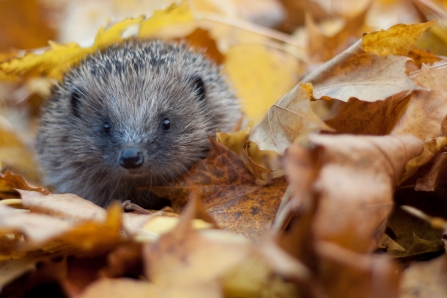
Hedgehog c. Tom Marshall
Leave prunings and leaves in a wild corner for hedgehogs to use when makingnests. Hedgehogs love apple and cherry leaves, and hawthorn and honeysuckleprunings make good structural supports.
Hedgehogs and other wildlife may nest under sheds, patios and pavings. It's important to check these structures carefully for any sleeping critters before removing or relocating them.
Build a hedgehog-friendly pond
A pond is the single most important thing you can do for wildlife in your garden. However, ponds can also be dangerous for hedgehogs. Incorporate a sloped gravel beach or put a ramp into any pond or water body in your garden to allow hedgehogs and other animals to climb out if they take a dip.
Leave a leaf pile
Damp leaves provide the perfect shelter for ground beetles, worms and other tasty bugs. Leaves also provide the perfect nesting material for hedgehogs, which can move their bed several times throughout winter.
Mulch beds with garden compost
This encourages plenty of earthworms, woodlice and beetles as it begins to rot down. What's more, rotted leaf litter makes perfect plant food and will help your garden thrive.
Compost carefully
Hedgehogs love a good compost heap, so take care when turning with heavy equipment. Spread the heap before October/November ahead of hibernation.
Bonfires
Everyone loves Bonfire Night, but be aware that this is the time when hedgehogs hibernate and a bonfire can make a perfect nest. Before lighting, rebuild bonfires to allow hedgehogs to relocate.
Cutting grass
Strimmers severely hurt hedgehogs. Before cutting overgrown areas, check for hedgehogs and other wildlife. Beat the top of vegetation lightly to scare away hiding wildlife.
Netting & litter
When protecting your plants, make sure netting is 1ft off the ground to prevent hedgehogs and other animals from becoming entangled. Tidy up, as litter can be lethal. Cut in half the plastic rings found around cans, and pinch cans shut to help wildlife. You can also play a part in wider conservation by recycling effectively.

